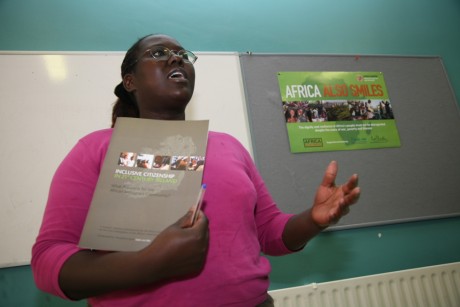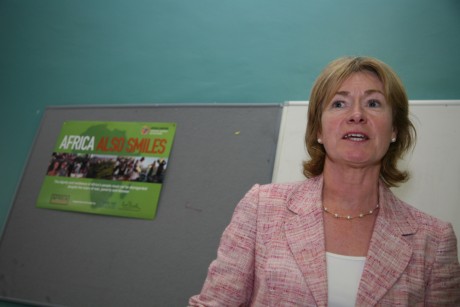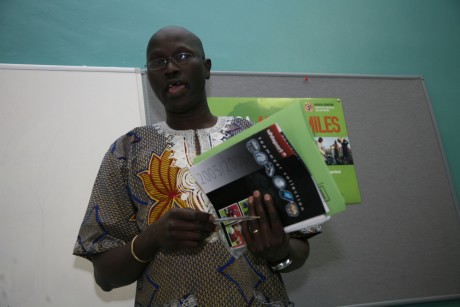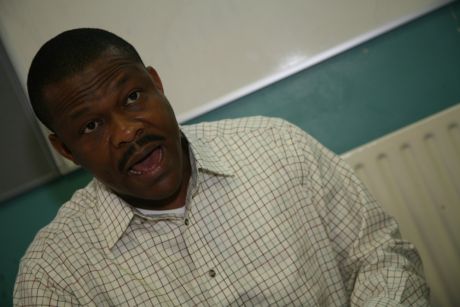Political activism and the Irish African Community.
A new report commissioned by the Africa Centre, examines the level of participation in civil society of the Irish African community and explores the reasons for varying degrees of activism and suggests some recommendations.

Ms. Neltah Chadamoyo, Chairperson of the Africa Centre
Inclusive Citizenship in 21st century Ireland: What Prospects fort the African migrant community.
A research initiative commissioned by the Africa Centre on the Civic Participation of the African community in Ireland.
A new report commissioned by the Africa Centre, examines the level of participation in civil society of the Irish African community and explores the reasons for varying degrees of activism and suggests some recommendations.
More people than anticipated attended the launch of the research document on inclusive citizenship at the Africa Centre, Abbey St., Tuesday 18th July. The report examines the how’s, why’s, wherefores and important ‘why not’s’ on the participation of the wider African community in Irish Civic Society. This makes a valuable contribution to the debate on the role of migrants and ethnic minorities within Irish society, according to Ms. Neltah Chadamoyo, Chairperson of the Africa Centre. This is also set in the wider context of a declining active citizenship in the EU.
Mary Davis, CEO of Special Olympics Ireland and the chair of the Task Force on Active Citizenship, launched the report. Ms Davis very much welcomed the report and said it had very practical and easy to implement suggestions and that she would submit it to the task force, but, also recommended that a wider constituency of people submit it also.
In his talk, Theophilus Ejorh, the author of the report, commended the setting up of the task force but noted that “the non-inclusion of any individual from the immigrant/minority ethnic communities on it is rather disturbing.” He explained further that, “this particular gesture by our Leaders looks to me like a tacit denial of the relevance of immigrants/ethnic minorities in Irish society. It also negates the multicultural sensibilities of a 21st century Ireland.” He asked if this meant the new communities had “no role to play in the civic development of Ireland?”
The research wished “to demonstrate that Ireland’s evolving communities can participate actively if the have better opportunities, acquire a voice and generate spaces for greater engagement with society.” The main inhibitory factors found in this survey, which block active citizenship, include work commitments, racism, and lack of information, family commitments and language barriers. The study found that there was a higher involvement with community sector and voluntary organisations of 63% and 68% respectively. The voluntary sector had a higher rate of participation as respondents explained that they chose “to partake or support the works of NGO’s chiefly because they see these organisations as potential channels through which they could address their problems or speak to Irish authorities about their situation.”
This level of participation is in stark contrast with political activism, which was a key issue for the research. Only 12% of respondents said they were involved in some form of political activism. Some of the reasons the other 88% gave for political in-activism included lack of time, information and interest! What is of interest to political organisations and groups is that only 2% said they belong to a political association. This lack of activism or alienation from all manner of political systems is further highlighted in the local elections. In the 2004 elections only 27% of interviewees voted, leaving a massive 73% disenfranchised. Reasons for this are important. Only 17% expressed no interest in the elections, while 7% were asylum seekers and were not entitled to vote. The lack of regularized residency status accounted for 40% while 30% said that they had not registered also.
Recommendations came from the suggestions and needs of interviewees. These range from developing more language courses, to political parties creating opportunities for minorities to become members and candidates in elections. Nationally the focus is on the government to promote active citizenship and the setting up of a National Consultative Forum for the immigrant/minority community.
The final word rests with Theophilus,
“So, what conclusions can we draw from all these?... First we can rightly affirm that African migrants are hungry to participate actively in Irish society and contribute quota to its continued development. Second there are certain barriers that hamper immigrant/ethnic minority participation. Third, if these barriers were removed through proper inclusive policy mechanisms, the African and other immigrant/minority ethnic groups would be actively involved in Irish civic life.”

Mary Davis, CEO of Special Olympics Ireland and the chair of the Task Force on Active citizenship

Dier Tong, Co-ordinator of the Africa Centre

Theophilus Ejorh
 national |
rights, freedoms and repression |
news report
national |
rights, freedoms and repression |
news report
 Saturday July 22, 2006 03:48
Saturday July 22, 2006 03:48 by Paula Geraghty
by Paula Geraghty mspgeraghty at yahoo dot ie
mspgeraghty at yahoo dot ie




























 printable version
printable version

 Digg this
Digg this del.icio.us
del.icio.us Furl
Furl Reddit
Reddit Technorati
Technorati Facebook
Facebook Gab
Gab Twitter
Twitter
View Full Comment Text
save preference
Comments (8 of 8)